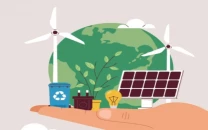The week in focus
The ‘demise’ of Pepco is not expected to substantially address the persistent woes of power.

The week in focus
Meeting a longstanding demand of multilateral lenders, the government on Friday dissolved Pepco which, according to reports, swallowed billions of rupees in subsidies every year. The government also announced that it would give autonomy to power distribution companies across the country. Under this arrangement, these companies will be asked to efficiently manage their business and administrative affairs to restrict losses.
This is the first step in power sector reforms and much more is required over the long run if the government wants to eradicate inter-corporate debt, estimated at Rs400 billion, from the energy sector.
Months earlier, the government had formed a holding company which took over inter-corporate debt of Rs300 billion from the sector through bank loans. But the story did not end there and thereafter new debt started piling up. It is hoped that the step to dissolve Pepco in order to tackle the problem will not be the last move and that more changes will follow.
The Planning Commission’s deputy chairman, Dr Nadeem Ul Haque, talking to The Express Tribune said that the disbanding of Pepco is the beginning of a long journey during which all wrongs associated with the power sector will be put right. “This is a first step and in the next phase measures will be taken to improve the performance of distribution companies. It may take seven to eight months.”
Elaborating, he said, the government will help the power companies become efficient and equip them with new technology. Smart power meters will be introduced and technocrats and professionals will be brought in.
“We will take measures to recover dues from electricity consumers, including government departments, and in that respect we will resort to soft as well as strict moves,” he said in a lighter vain.
Inter-corporate debt has plagued an entire chain: from refineries and oil marketing companies to power producers and distributors. Power theft, line losses, non-payment of bills and decrepit infrastructure are part of the problem.
Khurram Shehzad, Research Head at InvestCap, called for addressing the structural issues in the sector including control over corruption, bringing down high transmission and distribution losses and revival of infrastructure. “The whole chain – from power production to supply – needs to be improved. The inter-corporate debt problem will take two to three years to get resolved.”
He suggested privatisation of all power companies but not on the pattern of Karachi Electric Supply Company, whose sell-off to a private investor could neither resolve problems of the company nor of Karachi residents who endure at least four to five hours of power outages every day.
The government is already planning to float 20 per cent shares of these companies. “It must offer incentives, including handsome returns, to encourage determined investors to take over the management of these companies.”
Meanwhile, Hamad Aslam, Head of Equity at BMA Capital, suggested a long-term solution to the sector’s woes. “Less reliance on the expensive furnace oil for power production, control over theft and transmission losses are areas where the government should focus.”
He said that the cost of power production will remain high unless line losses are brought down and transparency is introduced in business affairs. Citing a basic example, he said that while Pakistan’s production capacity is around 18,000 megawatts, actual production is only 10,000 to 11,000 megawatts.
the writer is incharge Business desk for the Express tribune
Published in The Express Tribune, October 4th, 2010.


















COMMENTS
Comments are moderated and generally will be posted if they are on-topic and not abusive.
For more information, please see our Comments FAQ